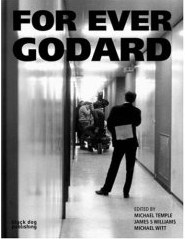
'For Ever Godard' By Michael Temple, James S. Williams and Michael
Witt (editors) , London: Black Dog Publishing, 2007. ISBN 978 1
904 772828 461pp. (softback) £24.95
It would be somehow unsatisfying for a monumental book about one of
cinema's greatest intellectuals to overly precis its subject's
oeuvre, to make that life and career too convenient, simple and
straightforward. Thus, in its vast complexity For Ever Godard
satisfies as a kaleidoscope of academia, interrogating the man, the
work and the legacy, but it does not necessarily open up Godard's
career to a wider audience of potential film-goers and DVD purchasers.
Divided into four major sections, the twenty-two chapters do not
provide a chronological so much as thematic analysis of Godard's work.
In essence, the chapters are the many pieces of the jigsaw that form
the director- although this particular director has many possible
jigsaws to be made from his fifty year career. For Ever Godard
opens though with an eye-catching and most accessible illustrated
filmography- a marvellous piece of work!- which firmly establishes the
framework inside which the rest of the book functions. Once the essays
proper begin though, the tone shifts quite dramatically to an at times
rather "dense" narrative which can transform the subject under
discussion from a clear sharp image into one of fuzzy obscurity. An
example of this is Keith Reader's 'asynchrony, seen as a temporal form
of alterity, is a key trope in post-structuralist thinking...' (p.72),
which, by way of an exposition, is for me too "heavy"- the equivalent
of serving solid dumplings as a starter: all very nice in small
amounts, but with the rest of the feast to come a trifle off-putting.
Other essays, though at times overly wordy, suffer involuntarily from
referring to texts beyond the average reader's awareness, such as the
frustratingly unavailable Histoire(s) du cinéma, which
prevents a close affinity with the text from being made.
These comments made, For Ever Godard is an appropriately
focused work, drawing together many loose strands not previously
linked. One example of an innovative approach to Godard's work can be
found in a chapter detailing his relationship with museums, the
strength here being the way the author draws the reader's peripheral
awareness to bear on one particular aspect and therefore provides
enlightenment- surely the role of any critic. Another particularly good
chapter concerns 'The Written Screen', and Godard's use of writing
within his films, which paves the way for a creative 'scripto-visual
essay' (pp.234-248) which re-arranges frames from Godard films to form
'an accursed share of the world of images that is Godard's art'
(p.233). Surely even Godard himself would have approved of this.
Perhaps the difficulty faced by the twenty-four contributors to For
Ever Godard is the sheer diversity of the work of a man who, as
Philippe Dubois reminds us, 'started out as a film critic' (p.232) yet
who would go on to make films at the origin and heart of the New Wave
film movement (A Bout de Souffle), complex cinematic social
pieces ( Vent d'est) and later television films like
Grandeur et decadence d'un petit commerce de cinema . What is
accomplished in For Ever Godard is a panorama of academic
study, an in-depth linked group of writings about specific aspects of
Godard's career. Without the magnificent illustrations the book would
be, frankly, heavy-going, but the images act as a re-inforcement of the
points being made as well as a reminder of the very visual nature of
Godard's cinematic practice.
As he approaches his eightieth birthday, Godard is perhaps unlikely to
make further forays into filmmaking, which is a great shame. His legacy
though, as For Ever Godard reminds us, is an indisputably rich
one- and one that will continue to baffle, challenge and above all
intrigue audiences interested in film and the processes of its
construction. At 461 pages, For Ever Godard is not a book to be
read in one sitting (and not even in one week) but is one to act as an aide
memoire, should it be needed, of a man who, to all intents and
purposes, IS cinema. If it is for this reason alone that For Ever
Godard is acquired, then it is reason enough.
'For Ever Godard' is published by Black Dog Publishing.
Black Dog Publishing
website
Back
Home

